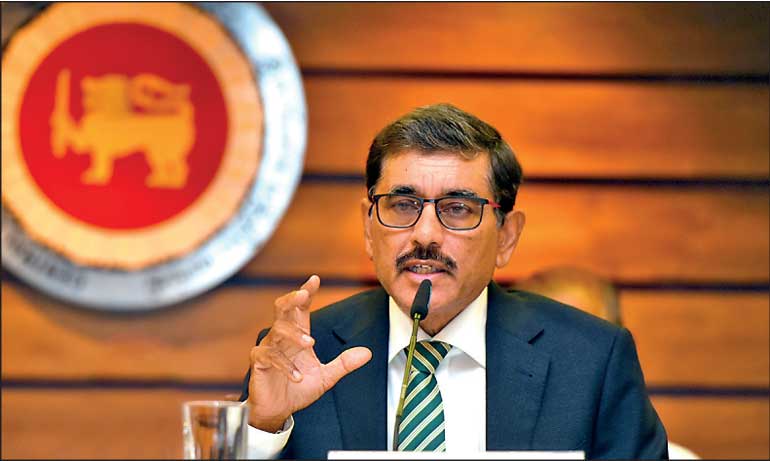Wednesday Feb 18, 2026
Wednesday Feb 18, 2026
Saturday, 9 April 2022 01:20 - - {{hitsCtrl.values.hits}}
 Central Bank Governor Dr. Nandalal Weerasinghe - Pic by Ruwan Walpola
Central Bank Governor Dr. Nandalal Weerasinghe - Pic by Ruwan Walpola
By Nisthar Cassim
The worsening economic crisis has forced the Monetary Board to effect a historic monetary tightening with the new Central Bank Governor justifying the move as critical to ensure macroeconomic stability.
The Monetary Board at its meeting under new Governor Dr. P. Nandalal Weerasinghe decided to increase the Standing Deposit Facility Rate (SDFR) and the Standing Lending Facility Rate (SLFR) of the Central Bank by 700 basis points to 13.50% from 6.50% and 14.50% from 7.50%, respectively with immediate effect.
“This is the highest ever policy rate hike and tightest monetary policy action in the history of the Central Bank of Sri Lanka and this critical decision was after a honest and realistic assessment by the Monetary Board,” Dr. Weerasinghe told journalists at a late evening briefing following the Monetary Board meeting.
He also described the Monetary Board move as “proactive”, implying that some of the decisions in recent times had not been so, hence the ongoing crises in the country.
In its brief statement, the CBSL said the Monetary Board noted the inflationary pressures that could further intensify in the period ahead, driven by the build-up of aggregate demand, domestic supply disruptions, exchange rate depreciation and the elevated prices of commodities globally.
It was of the view that a substantial policy response is imperative to arrest the build-up of added demand driven inflationary pressures in the economy and pre-empt the escalation of adverse inflationary expectations, to provide the required impetus to stabilise the exchange rate and also to correct anomalies observed in the market interest rate structure.
Dr. Weerasinghe also told journalists that the decisive monetary policy action will send a strong message to markets and investors that the new leadership at CBSL is taking corrective action to ensure macroeconomic stability and confidence. “When the markets open on Monday we also expect the banking and financial community to respond positively,” he added.
He said the move will help suppress excessive demand, curb imports thereby reduce pressure on forex reserves, reign-in a higher inflation in the medium term. However, he cautioned that proper beneficial impact of yesterday’s decision will be felt only in three to six months and in the interim inflation is forecast to rise from current 17.5% to over 25% due to past policy slips.
“It is not an easy situation. We can’t turn around a crisis caused by two years within two days. However I am confident in Central Bank playing its part for an early turnaround,” the new Governor added.
Dr. Weerasinghe also said that whilst tighter monetary policy and other planned measures including an IMF support program along with a foreign debt restructuring strategy and prudent fiscal policy can help towards creating a conducive environment, for greater macroeconomic stability, the ongoing political crisis and social unrest must end.
“The pace of turnaround (with new CBSL measures and IMF support) and an end to sufferings of the people depends on restoration of political stability and normalcy,” he added.
The new Governor also promised to restore the independence and credibility of the CBSL. “An independent Central Bank is the only way to ensure prudent policies irrespective of politics. The existing Monetary Law Act provides for such independence. I will not tolerate political interference during my tenure and I have the fullest support of the Government, the Opposition and the public,” he said.
“CBSL is accountable and responsible to the people not a political party. I have to live up to public expectations of ensuring CBSL independence and credibility,” added Weerasinghe, who was previously a Senior Deputy Governor and took early retirement in October 2020 after he was side-lined in the early part of the Gotabaya Rajapaksa administration.
